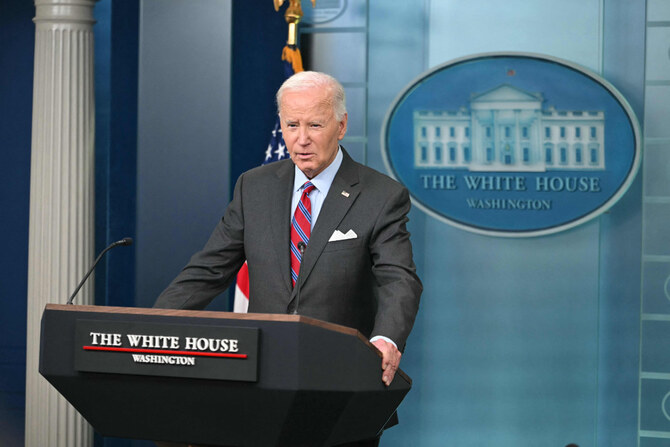WASHINGTON: President Joe Biden had terse words for Prime Minister Benjamin Netanyahu on Friday, and said he didn’t know whether the Israeli leader was holding up a Mideast peace deal in order to influence the outcome of the 2024 US presidential election.
“No administration has helped Israel more than I have. None. None. None. And I think Bibi should remember that,” he said, referring to the Israeli leader by his nickname. “And whether he’s trying to influence the election, I don’t know, but I’m not counting on that.”
Biden, in a rare appearance in the White House press briefing room, was responding to comments made by one of his allies, Sen. Chris Murphy, D-Connecticut, who told CNN this week that he was concerned Netanyahu had little interest in a peace deal in part because of US politics.
“I don’t think you have to be a hopeless cynic to read some of Israel’s actions, some of Prime Minister Netanyahu’s actions, as connected to the American election,” Murphy said.
Biden and Netanyahu have long managed a complicated relationship, but they’re running out of space to maneuver as their views on the Gaza war diverge and their political futures hang in the balance.
For Biden, a diplomatic deal would help resolve a deep divide among Democrats over the war and shore up support for Vice President Kamala Harris, making one fewer global conflict for her to manage should she win next month. Netanyahu has his own political concerns closer to home: His far-right coalition would abandon him if he stopped the war, and he could lose power and have to face his own legal problems. And Israel has been decimating Hezbollah’s leadership, so there is little incentive to stop now.
Biden has long pushed for a diplomatic deal, and he and his aides have indicated several times over the past few months that such an agreement was close. But it never seems to materialize, and in some cases, Netanyahu has publicly resisted the prospect while US and Israeli officials continue to talk in private about eking out a deal.
Just last week, the US, France and other allies jointly called for an immediate 21-day Israel-Hezbollah ceasefire, and expected Israel to welcome if not fully endorse the plan. Instead, Netanyahu publicly rejected it, telling leaders gathered for the UN General Assembly that Israel would “continue degrading Hezbollah until all our objectives are met.”
Israel has pressed forward on two fronts, killing top Hezbollah leaders and pursuing a ground incursion into Lebanon and conducting strikes in Gaza that killed dozens, including children. And the nation has vowed to retaliate for Iran’s ballistic missile attack this week.
Oil prices rose 5 percent Thursday as concerns mounted that Israel would hit Iranian oil facilities as payback; a surge in gas prices so close to the election would be a blow to Harris, particularly after strong economic news Friday.
Biden said there had been no decision yet on what type of response there would be toward Iran, though “I think if I were in their shoes, I’d be thinking about other alternatives than striking oil fields.”
He pushed back against the idea that he was seeking a meeting with Netanyahu to discuss the response to Iran. He isn’t, he said.
“I’m assuming when they make a decision on how they’re going to respond, we will then have a discussion,” he said.

A man walks amid the rubble of a building leveled in an overnight Israeli airstrike that targeted the neighborhood of Moawwad in Beirut's southern suburbs on October 3, 2024. (AFP)
But Netanyahu has grown increasingly resistant to Biden’s public charm offensives and private pleading, prompting the president’s more assertive pushback. And Biden has in turn publicly held up delivery of heavy bombs to Israel and increasingly voiced concerns over an all-out war in the Middle East.
Despite their long acquaintanceship, the two are not close or particularly friendly. When Biden was visiting Israel as vice president under Barack Obama, he and other US officials were taken aback by an Israeli government announcement of new Jewish settlements in the West Bank, something the administration strongly opposed.
Nevertheless, Biden has remained consistent in his support for Israel’s defense and security. In the aftermath of the deadly Oct. 7 Hamas attacks in Israel, he hugged Netanyahu on the tarmac of the airport in Tel Aviv. Since then, with few exceptions, Biden has supported ongoing and enhanced US arms transfers to Israel while at the same time cautioning the Israelis to be careful in their responses to avoid civilian casualties.
“The Israelis have every right to respond to the vicious attacks on them, not just from the Iranians, but from everyone from Hezbollah to Houthis,” Biden said Friday. “But the fact is that they have to be very much more careful about dealing with civilian casualties.”
Biden has also ordered the US military to step up its profile in the region to protect Israel from attacks by Hamas, Hezbollah, the Iranian-backed Houthi rebels in Yemen and Iran itself. In April, and again earlier this week, the US was a leading player in shooting down missiles fired by Iran into Israel.
By contrast, Republican Donald Trump and Netanyahu have had a much more cordial relationship. Trump hosted Netanyahu in July. While president, Trump initiated policy changes that Netanyahu applauded, including recognizing Jerusalem as the capital of Israel, moving the US embassy there from Tel Aviv, recognizing Israeli sovereignty over the Golan Heights and rescinding a decades-old US legal determination that Jewish settlements in the West Bank were inconsistent with international law.














